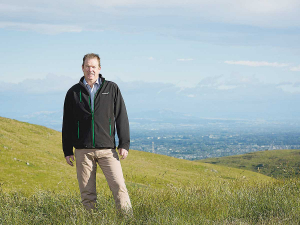Ravensdown partners with Footrot Flats to celebrate Kiwi farming heritage
Ravensdown has announced a collaboration with Kiwi icon, Footrot Flats in an effort to bring humour, heart, and connection to the forefront of the farming sector.
 Departing Ravensdown chief executive Greg Campbell says it's time to hand over the reins to someone with new ideas.
Departing Ravensdown chief executive Greg Campbell says it's time to hand over the reins to someone with new ideas.
Departing Ravensdown chief executive Greg Campbell says his first year at the fertiliser co-op was the toughest.
He took over in 2012, when the farmer-owned fertiliser co-op has - for the first time - paid no rebate to shareholders, carried a high level of debt and reported poor profit.
Campbell remembers having to front up to the board with his plan to revitalise the business. He says the board was "bold" and backed his plan.
"I also remember having to roll out the plan...having some tough discussions with our shareholders around what we were planning to do," he told Dairy News/
"Across the business there was overwhelming support for the plan and we delivered on that promise."
Campbell started his six-month notice period in December last year. After serving eight years at Ravensdown, part of a 25-year stint in chief executive roles he says the time is right to step down.
"I'm not leaving through being dissatisfied. I think it's time to hand over the reins to someone with new ideas."
Campbell attributes the achievements at Ravensdown during the past eight years to a team effort by staff, leadership, board members and farmer shareholders.
"We have accomplished some good things together," he says.
In the early years, he was instrumental in the co-operative exiting Australia, focusing on the financial fundamentals and bcoming even more science-led.
Campbell initiated the setting up of what was to become the largest farm environmental consultancy in New Zealand. This was done in anticipation of possible regulations and also in response to shareholder feedback that farmers needed to help mitigating their impacts - not just growing as much as possible.
His consistent message, over the years, is that the farm-erowned co-operative needed to be selling the right amount of fertiliser, not the most.
Campbell has encouraged greater nutrient use efficiency so that the expense and potential environmental impact of essential nutrients were optimised.
The ClearTech effluent management system, which he believes has the potential to transform a dairy farm's greshwater use, was launched in 2018.
The purpose of Ravensdown's business changed under his watch - moving from providing essential impact at lower cost - to enabling smarter farming for a bettr New Zealand.
Campbell believes his legacy is leading the co-operative's transformation from a predominantly "fert company" to being seen as the "farm nutrient and environmental experts".
Campbell's legacy
The 5+ A Day Charitable Trust has launched a collection of affordable recipes designed to turn everyday vegetables into seasonal stars.
Jane Mellsopp has been confirmed as the new Government Appointee to the New Zealand Meat Board (NZMB).
To celebrate the tenth anniversary of its annual Good Deeds competition, Rabobank will give away $100,000 to improve rural community hubs, schools, clubrooms, and marae across New Zealand.
Agricultural and veterinary product supplier Shoof International has appointed Michaela Dumper as its new chief executive.
Federated Farmers is celebrating following the Government's announcement that young farmers will be able to use their KiwiSaver funds to buy their first home or farm.
The Meat Industry Association of New Zealand (MIA) today announced that Chief Executive Officer Sirma Karapeeva has resigned from the role.